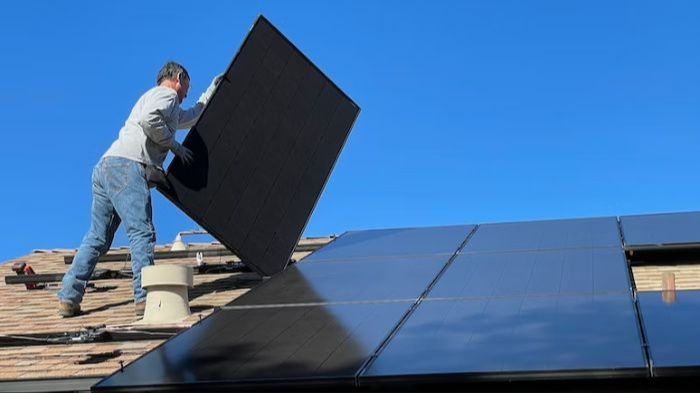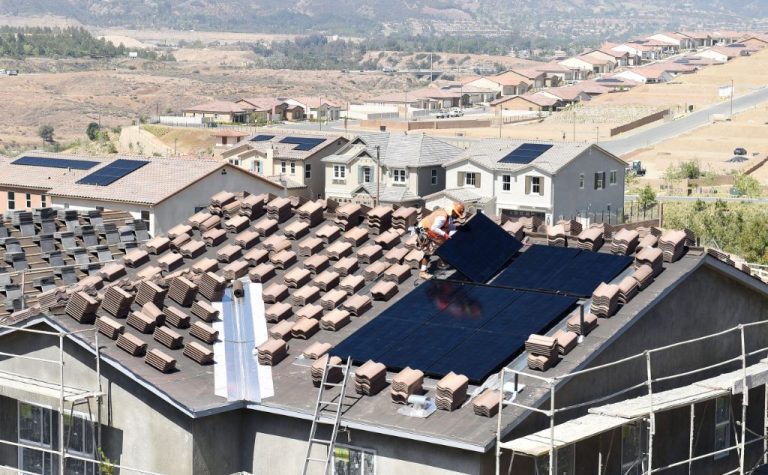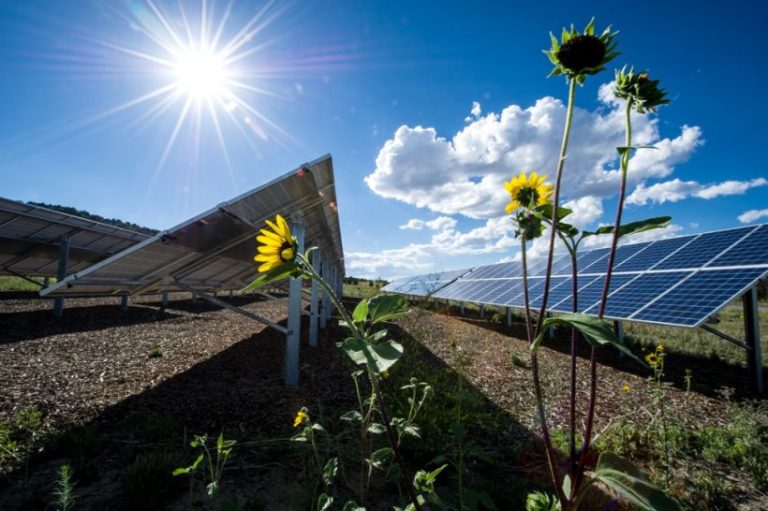How Do I Start My Own Solar Company?
Learn About the Solar Industry

According to the U.S. Solar Energy Industries Association, as of 2022, more than 263,000 Americans work in solar at more than 10,000 companies in every U.S. state. The solar industry generated over $36 billion in revenue in 2022. [1]
The global solar power market size was valued at USD 167.83 billion in 2021 and is projected to grow to USD 373.84 billion by 2029, exhibiting a CAGR of 10.9% during 2022-2029. Major factors driving this growth include government incentives and regulations supporting renewable energy adoption, declining costs of solar systems, and increased public awareness. [2]
Some of the major players in the global solar market include SunPower, First Solar, Canadian Solar, JinkoSolar, and LONGi Green Energy Technology. Trends boosting solar demand include improvements in panel efficiency, expanded utility-scale solar farms, and growth of residential solar installations. [3]
The solar industry is poised for strong continued growth as solar power becomes increasingly cost competitive with conventional power sources. Supportive government policies, technology advances, and climate change concerns will further accelerate solar adoption going forward.
Decide What Services to Offer
When starting a solar company, one of the first decisions is determining what services to offer customers. There are two main options for solar installations: residential and commercial. Residential solar entails installing rooftop systems on homes, while commercial solar involves larger installations on businesses, warehouses, schools, etc. Many solar companies focus on one or the other, while some offer both residential and commercial services. Beyond installations, solar companies can also provide solar panel sales and leasing, as well as ongoing maintenance and repair services.
For residential solar, most homeowners are interested in owning their solar panel system rather than leasing. However, leasing can be an attractive option for those wanting to go solar with little upfront costs. When selling solar panels, financing options like loans and payment plans can help customers afford the systems. Maintenance services are also important for keeping solar panels performing optimally over their 25+ year lifespan.
For commercial solar customers, owning the system also tends to be preferable to leasing. Solar leasing companies focus on financing and managing these large installations. But for solar companies doing the actual installations, offering strong maintenance and repair services ensures continued business from commercial clients relying on their solar system. Determining the right mix of installation, sales, leasing and maintenance services based on the target customer base is key when starting a solar company.
Obtain Necessary Licensing and Permits
To legally operate a solar installation business, you’ll need to obtain the proper licenses and permits at the federal, state, and local levels. This includes registering your business name and structure, securing state contractor licenses, and getting local construction and electrical permits for each job.
At the federal level, you generally need to register your business name and obtain an Employer Identification Number (EIN) from the IRS. You may also need additional tax licenses depending on your business structure and location.
Most states require solar contractors to hold a specialized solar contractor license or certification in order to operate legally. For example, California requires a C-46 Solar Contractor License issued by the Contractors State License Board (CSLB) [1]. Licensing requirements vary widely by state, but often involve a combination of experience, exams, and continuing education [2].
There are also national certification programs, like the North American Board of Certified Energy Practitioners (NABCEP), that provide voluntary solar credentials. While not mandatory, these certifications can demonstrate your expertise and credibility to customers.
At the local level, you’ll need electrical and building permits for every solar installation job. The specifics depend on the local jurisdiction, but will ensure your work meets all safety and code requirements.
Carefully researching and obtaining all necessary licensing is a critical first step to operating a legal and credible solar business in your state and locality.
Hire Qualified Staff
A successful solar company requires skilled professionals in various roles. Here are some key positions to fill:
Installers: Hire installers with training and experience in solar PV systems to properly mount panels and connect electrical components. Many complete vocational programs or apprenticeships focused on solar installation.[1]
Engineers: Employ engineers (electrical, mechanical, civil) to design systems and ensure installations meet codes and regulations. Most have at least a bachelor’s degree in engineering.[2]
Electricians: Licensed electricians are needed to safely connect solar systems to the electrical grid while following local and national electrical codes.[3]
Sales and Administrative Staff: Hire salespeople to generate leads and educate potential customers. Administrative staff will manage daily operations, finances, permitting, and more.
Providing ongoing training is crucial so all staff stay up-to-date on the latest technology, regulations, and best practices in the industry.[4]
[1] https://www.bls.gov/green/solar_power/
[2] https://www.bls.gov/ooh/architecture-and-engineering/solar-photovoltaic-installers.htm
[3] https://www.nccer.org/news-research/career-resources/careers-in-solar-power
[4] https://www.seia.org/news/new-report-lays-out-workforce-training-needs-rooftop-solar-industry
Secure Funding and Financing
Starting a solar company requires substantial upfront funding and ongoing operating capital. According to Finmodelslab, startup costs for a small solar installation business can range from $50,000 to over $500,000 for a large-scale utility provider. These costs include equipment, inventory, licensing, legal fees, marketing, and working capital. Operational expenses like payroll, insurance, maintenance, and expansion also need to be budgeted.
Several financing options are available to help secure startup and operating funds. Business loans and investments from banks, private investors, or government grants are common. It’s also possible to use equipment leasing, lines of credit, or other lending sources. Many solar companies need a mix of financing options to launch and sustain operations.
For customers, solar companies can offer financing programs like power purchase agreements (PPAs), leases, and loans. These allow the solar provider to fund and install a system on a customer’s property with options to purchase or make payments over time. The right financing plans make solar more affordable for customers.
Source Equipment and Materials
One of the most crucial steps when starting a solar company is sourcing high-quality solar equipment and materials to install, including solar panels, inverters, and racking systems. According to the Solar Photovoltaics Supply Chain Review Report from the U.S. Department of Energy (https://www.energy.gov/eere/solar/solar-photovoltaics-supply-chain-review-report), crystalline silicon panels accounted for 84% of the U.S. market in 2020.
It’s important to identify reputable manufacturers and distributors of solar equipment and develop strong relationships with them. Distributor relationships can provide benefits like volume discounts, favorable payment terms, and priority access when supply is constrained. Some of the major global suppliers of solar panels include First Solar, JinkoSolar, Canadian Solar, and Trina Solar.
When buying solar equipment, be sure to verify certifications and warranties. Maintaining proper inventory levels is also key – too little risks delays and losing sales, while too much ties up cash flow. Use demand forecasting and planning to optimize inventory purchases and financing. Store equipment properly to avoid damage or theft.
Find Customers and Market Services
Marketing is essential for finding new customers and promoting your solar services. Developing an effective digital marketing strategy should be a top priority. Focus on search engine optimization (SEO) to boost your website’s rankings and make it easy for potential customers to find you online according to this source. Produce targeted content like blog posts and videos that use relevant keywords. Pay for Google and social media ads to reach local homeowners looking for solar power.
Don’t forget traditional marketing like direct mail and attending industry events as covered in this guide. Create brochures, flyers, and mailers to distribute. Network at conventions and meetups to connect with prospects face-to-face. Partner with solar retailers to cross-promote each other’s services.
Develop a sales process to effectively convert leads into customers. Make your website easy to navigate with clear calls-to-action. Follow up promptly on inquiries and provide customized quotes. Establish a pipeline to track leads and focus your efforts on hot prospects first. Offer promotions and discounts to incentivize conversions. Providing a great customer experience is the best way to generate referrals.
Deliver Excellent Service
Providing excellent customer service is crucial for any solar installation company. From the initial sale to post-installation support, you need to manage projects seamlessly and meet customer expectations. Some tips for delivering great service include:
Carefully plan and execute each installation project from start to finish. Assign tasks and deadlines to your team and closely track progress. Communicate frequently with customers to keep them updated on timelines and next steps. Address any delays or issues promptly to prevent projects from going over budget or past deadlines. See https://www.linkedin.com/advice/0/how-can-you-improve-your-customer-service-skills for more project management tips.
Follow up with customers after the solar installation to ensure their satisfaction. Provide instructions on properly maintaining the solar panels and answer any questions they have. Offer continued support by phone, email, or in-person to troubleshoot any technical issues. Maintaining strong relationships post-sale builds loyalty and positive word-of-mouth. Read https://www.podium.com/article/how-to-improve-solar-customer-experience-solar/ for excellent post-installation tips.
Manage Finances and Operations
To establish long-term viability and growth, a solar company must develop efficient business operations and financial management practices. Key focus areas include:
Cash flow and profitability: Carefully monitor cash flow and set realistic financial goals for profit margins on services. Invest excess profits back into the company for future growth. Utilize financing strategies like lines of credit to maintain positive cash flow during slower periods.
Safety, quality control, and regulatory compliance: Develop standardized protocols and training to ensure work is completed safely, efficiently, and in accordance with all regulations. Conduct quality inspections and safety audits routinely. Maintain proper licensing and insurance policies.[1]
Improving systems over time: Continuously evaluate operational processes to identify areas for improvement. Implement solutions like software systems to increase organization and automation where beneficial. Solicit feedback from staff and clients to improve offerings and experiences.
With diligent operations and financial management, a solar company can position itself for sustainability and potentially expansion into new markets or service offerings.
[1] https://www.energy.gov/eere/solar/solar-operations-and-maintenance-resources-plant-operators
Plan for Long-Term Growth
Solar companies need to think about how they will continue growing over the long run. There are several strategies for scaling up a solar business:
Expanding to new markets and services is one approach. For example, a residential solar installer could begin doing commercial installations as well. Or a company could expand from just doing solar panel installation to also providing associated services like panel maintenance, battery backup systems, EV chargers, etc. Diversifying into new offerings creates additional revenue streams.
Opening operations in new locations and aiming for greater scale is another growth strategy. Expanding to new cities or states allows accessing more potential customers. Hiring additional crews and staff enables taking on more projects at once. At a certain point, a small local business transitions into a large regional or national company.
Finally, solar entrepreneurs should consider their eventual exit strategy. Founders may aim to sell their business or take the company public through an IPO at some point. Or they may plan to pass operations on to a new generation of family leadership. Having a transition plan helps guide decisions to build a valuable, sustainable enterprise.
For more insights, see 5 Pro Tips to Boost Your Solar Business Growth Effectively.






